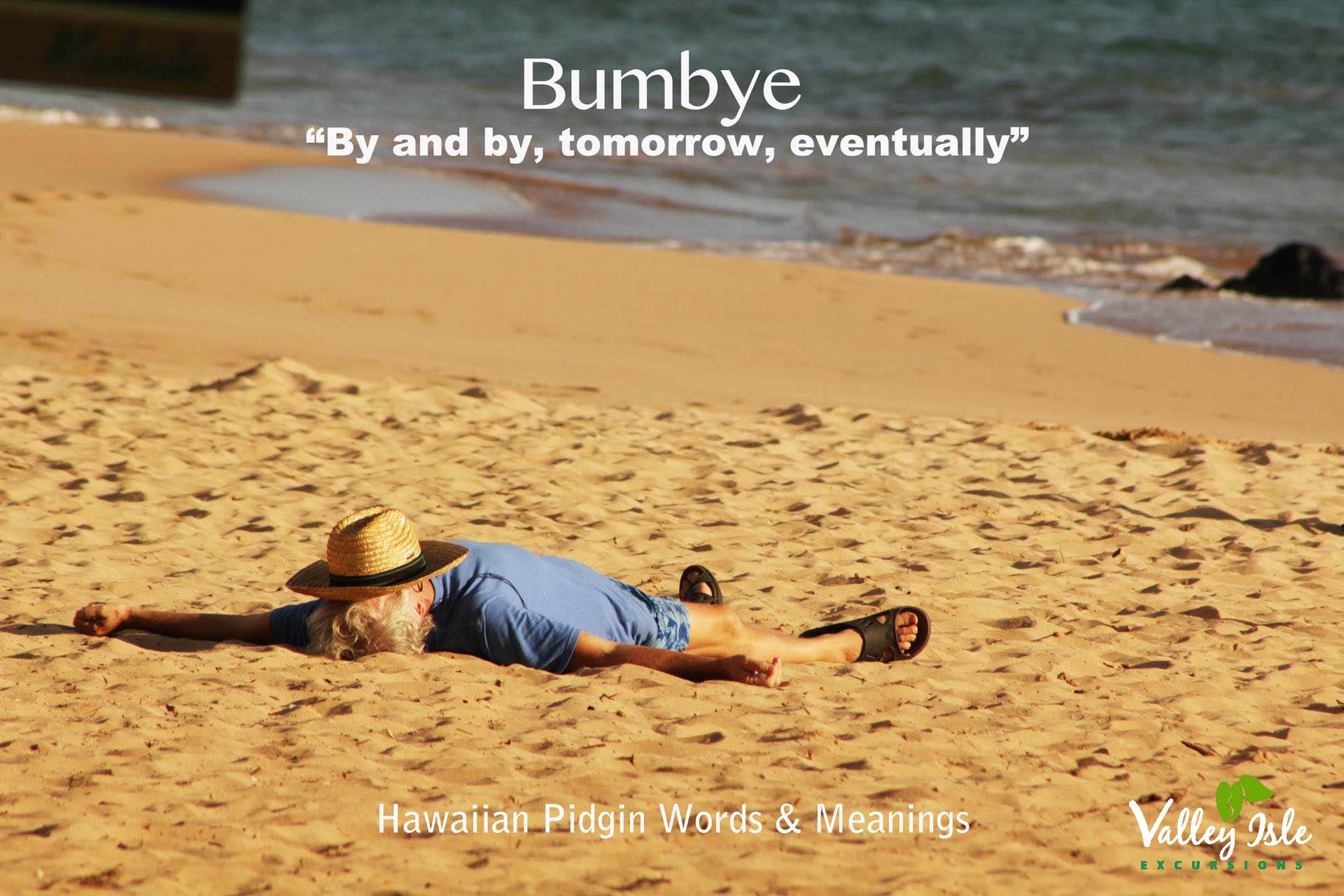
Hawaiian Pidgin English
Hawaiian Pidgin Words & Meanings
Pidgin quotes and sayings
Hawaiian pidgin evolved from the sugar industry which began in the mid 1850’s on Maui. Immigrant workers came in waves from different countries to work in the sugarcane fields. The first waves of immigration where the Chinese, Japanese and Portuguese who needed to communicate with Haole (english speaking) bosses and Hawaiian locals. What developed was a blend of these languages that continued to evolve as waves of Okinawans, Puerto Ricans, Koreans and Filipinos arrived around 1900. These new languages were thrown into the mix and is today what many locals speak on a daily basis – Hawaiian pidgin.
The beauty of this language (it became an official language this year) is in the simplicity. The art of its use is the tough part though. It takes a certain type of intonation and not everyone can achieve the nuances without practice. The longer you’re around it the more you’ll understand but it takes years to speak it well so don’t bother trying…just use some words here or there.
Know that articles and verbs get replaced with slang. Da replaces “The”, Fo’ replaces “To”, and Wen replaces “When”. Other verbs can be replaced, for example, “Braddah, you like go beach?” is pidgin for “You want to go to the beach?”
Understand the common adjectives and names towards people. Lolo means idiot and Kolohe means troublemaker. In the islands, there is an “ohana” (family) slang towards others. Auntie and Uncle are used towards females and males that are older than you in a respectable way, for example your friend’s parents or a friendly supermarket cashier or bus driver. You are sure to bring a smile to the face of anyone older than you, especially local Hawaiian strangers, if you call them Aunty or Uncle!
Brah or Braddah are used for laid-back conversations or to get someone’s attention.
Don’t forget the differences between similar words. Hapai means pregnant while Hapa means half. Talk story means chatting or casual conversation and Talk stink means talking bad about someone else.
Below is a list of commonly used Hawaiian pidgin words. Keep in mind that new words are always being created but these are tried and true for locals throughout the islands.
A Language Of Many Cultures
English+Hawaiian-Chinese-Portuguese-Japanese-Spanish-Filipino
Pidgin Words & Meanings
If can can. If no can, no can. Called Pidgin Philosophy. Means: If I can get to it I will. If not I can not. Often shortened to “if can can” . Eh brah, you going to Aunty’s for suppa? I stay working but if can can.
akamai (ah-kah-MY). Smart, intelligent. Actual Hawaiian word as well. Dat Jimmy Boy plenny akamai. He wen mek one computah.
any kine (enee kyne) . Anything. No listen to dat tita, she say any kine, brah.
dass why. That is the reason. Grind too much, dass why you come so momona.
boddah you? Are you disturbed by this? Darlene wen go foa da beach wid me. Wot?Boddah you?
broke da mout. Broke the mouth. Absolutely delicious. Ho, Tutu’s malasadas so ono, brok da mout.
buggah. A chap, fellow. Ho, lolo dat buggah, Junior.
bumbye. By and by, tomorrow, eventually. Eh! You get dirty lickins bumbye you no stop dat!
choke. A vast amount. Ho, get choke mangoes dis yeah, brah!
cockaroach. To steal. Eh, who wen cockaroach all da manapua?
da kine. The kind. The ultimate pidgin phrase. Can mean virtually anything. 1)Eh, you get any da kine? 2)Ho, brah, dat’s da kine. 3) She wen da kine foa get da kine foa da kine.
da cute. Oh how precious! Did you see Pua’s new keiki? Da cute!
foa. For, used in place of “to”. Easy foa say, hahd foa do.
geev ‘um. Give them. Go for it. Ho, look at Waltuh Boy on dat beeg wave. Eh, geev ‘um, brah!
hana hou. Once more, again. Chee, LaVerne, do dat hana hou!
haole (HOW-lay). Person of Anglo persuasion. Another actual Hawaiian word. Can be explanatory or insulting. 1)My mom guys all haole, but my dad guys Hawaiian. 2) @#$*@ haole!
hapai (ha-PIE). With child. Charlene wen come hapai, ass why she no moa surfing.
kay den. All right. Kay den, I no show you mine.
like beef? Would you like to fight with me? Not a choice of entrees. Eh, haole boy, youlike beef? Kay den.
lolo. The antithesis of akamai. Not smart. Dat Junior, he so lolo he wen call Dwayne one mahu an he wen crack him. Now Junior stay all bus up.
mahu. A homosexual. See above.
moke (rhymes with coke). A very big, very local Hawaiian. See Dwayne in definition of lolo.
momona (mo-MO-nah). Actual Hawaiian word, meaning obese or ripe. In pidgin it always means fat. I thought Charlene stay momona, but she come hapai
no can. Unable to. I like foa go, but no can.
no moa. Completely out of, no more, none. Chee, we get no moa da kine. Bummahs.
one. Used in place of “a”. Eh, can get one ride foa da beach, brah?
ono (OH-no). Actual Hawaiian word, meaning delicious. In pidgin can also mean several other things. Ho, Junior, look at dat Charlene. She so ono, yeah?
pau (pow). Actual Hawaiian word, used constantly, meaning finished or done. Chee, I thought you pau already!
pau hana (pow HAH-nah). Another actual Hawaiian phrase. Means after work. Also after work drink. Junior wen bus up his truck. Get too many pau hana.
slippah (SLEE-pah). Thong, slipper. Chee, I wen bus my new slippah in dat puka.
stink eye. Dirty look. Ho, brah, Pua wen spok me in da cah wid Charlene an geev me stink eye.
tita (TIT-ah). Usually large, always tough, very local female version of moke. Eh, brah, nevah mess wid dat tita, she go’n bus you up.
try. Please. Try wait, eh? I come back bumbye. Get plenny customahs.
Shoots:
- A form of consent, “okay”
Example: Person 1: You like go beach, brah?
Person 2: Shoots!
- When used with “den,” it means “see you later”
Example: Person 1: Bye, see you tomorrow
Person 2: Shoots den! See ya.
Howzit (How-zit):
A form of salutation, essentially asking the other person how he or she is.
Braddah (brah-dah):
The Hawaiian version of “bro.” Also can be shortened to “brah.”
Dakine (dah-kai-n):
A word used when one cannot remember the name for something.
Example: “Hey, braddah can you pass me dakine?” Person 2: Dakine what?
Choke
Adj. plentiful
Example: “Dis restaurant give choke amounts of food.”
Junk:
Adj. bad
Example: “Dis coffee so junk. Not enough sugar.”
mo’ bettah:
Adj. better
Example: “These waves are mo’ bettah den da ones ova dere”
shaka (shah-kah):
A hand sign made by bringing the pointer, middle, and ring fingers down to the palm of a relaxed hand. Used as a sign of greeting and welcome.
slippahs:
- The word used in Hawaii instead of flip-flops
aurite (ow-rite):
all right, used as an exclamation when something goes right.
Example: “I just got a perfect on my quiz! Aurite!”
grindz:
- food, especially local food
Example: “Those grindz were so good.”
humbug
- a hassle or something irritating
Example: “Traffic is so humbug”
lidat (la-dat):
essentially means “like that”
Example: “Aww, no be lidat, braddah.”
small kine:
Adj. just a little bit
Example: “I am small kine unhappy today.”
Hapa
In the Hawaiian language, hapa means half. More recently, hapa has come to refer to anyone who is half Caucasian, and either half Asian or Hawaiian










